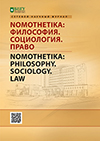Cultural capital and state strategy of Russia
DOI:
https://doi.org/10.18413/2712-746X-2020-45-2-366-370Keywords:
culture, cultural policy, knowledge society, cultural paradigmAbstract
For many decades of the late twentieth and early twenty-first century, Russia has been
searching for an Answer to the civilizational Challenge about the ways of its development and its identity.
«Socialism with a human face» was not implemented in the programs of Perestroika and acceleration.
The deconstruction of the USSR did not solve this problem by itself. Modern society is looking for an
ideological solution on the path of post-industrial society. However, the mechanisms of «cultural» capital
have not yet become the real dominant of social reproduction in Russia. The ideology and practice of the
superindustrial model in modern conditions presupposes a long-term strategy for the development of
human subjectivity, intellect, sensory-aesthetic and physical culture, a strategy for self-disclosure of the
individual and the achievement of a harmonious society. For this purpose, the basic basis of socialization
and education should be the didactics of an understanding person. The paper considers the ways and some
elements of such a strategy from the philosophical and semiotic positions. The author sought to show that
understanding is both the substance of social existence and the basis of social development.
Downloads
References
Богин Г.И. 2001. Обретение способности понимать: Введение в филологическую герменевтику. Тверь., Твер. Гос. Ун-т, с. 260.
Гриценко В.П. 2019. О проекте модернизации системы подготовки и аттестации научных кадров для региональных вузов. Культурные и научно-образовательные стратегии по реализации национальных проектов-2024. В кн.: Материалы I Международной научно-практической̆ конференции (Краснодар, 17–18 октября 2019 г.). Краснодар, Краснодарский государственный институт культуры: 66–70.
Игнатова В.С., Римский В.П. 2012. Проблема «традиции-инновации» и генезис научно-инновационных субкультур (культурно-цивилизационный контекст). Наука. Искусство. Культура, № 1: 34–57.
Люсый А.П. 2013. Московский текст. Текстологическая концепция русской культуры. М., Издательский дом «ВЕЧЕ»; ООО «Русский импульс»: 186–187.
Основы государственной культурной политики. 2014. http://base.garant.ru /70828330/ (дата обращения: 05 декабря 2019).
Петров М.К. 1991. Язык. Знак. Культура. М., Наука, 192 с.
Fukuyama, F. 2001. Social capital, civil society and development. Third World quarterly.
Tom.22, No. 1: 7–20.
Abstract views: 773
Share
Published
How to Cite
Issue
Section
Copyright (c) 2020 NOMOTHETIKA: Philosophy. Sociology. Law

This work is licensed under a Creative Commons Attribution 4.0 International License.


